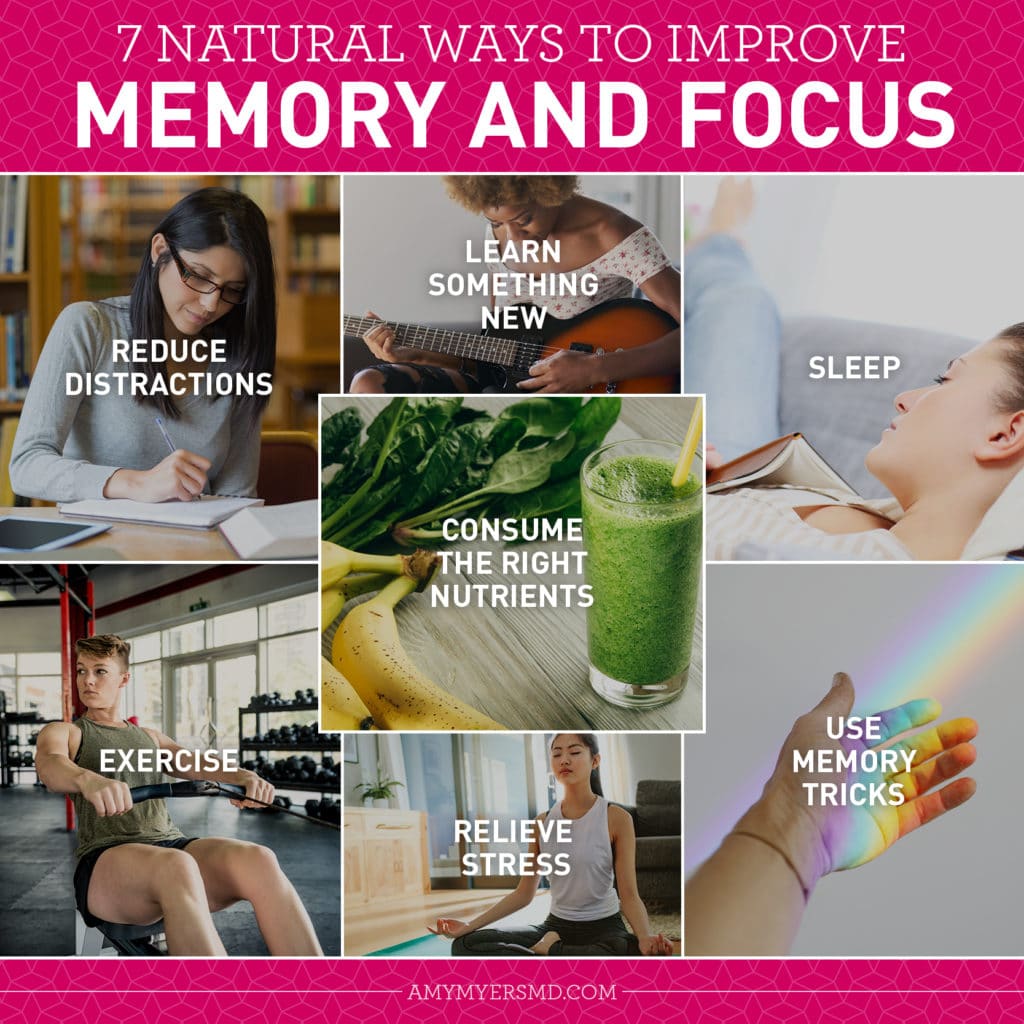Did you forget where you put your keys? Do you walk into a room and don’t remember why you went there? Does it seem you just don’t have the energy to focus on anything anymore? It happens to all of us — and not just as we age. It also happens when we are busy, stressed, or tired.
The good news is that your brain has nearly unlimited abilities! And fortunately, there’s a lot we can do to support cognitive function naturally, including taking supplements such as my custom-formulated NeuroLive™.
Natural Ways to Improve Memory and Focus
Memory loss can stem from sleep deprivation, stress, or ADHD (attention-deficit hyperactivity disorder), and in more extreme cases, from Alzheimer’s disease. Additionally, many people experience a slow age-related decline in their ability to focus and absorb new information. This slower processing of the brain can lead to a “pile-up” of information entering your short-term memory, which can then inhibit information retention in your long-term memory.
However, regardless of the cause of diminished function, you can incorporate simple steps into your everyday routine that will optimize your focus and your memory. Supporting a healthy brain now means you’re setting yourself up for future brain power with keen focus and the memory of an elephant!
 Dr. Amy Myers
September 30th, 2019
https://content.amymyersmd.com/article/improve-memory-focus/7 Natural Ways To Improve Memory And Focus – Infographic – Amy Myers MD®
Dr. Amy Myers
September 30th, 2019
https://content.amymyersmd.com/article/improve-memory-focus/7 Natural Ways To Improve Memory And Focus – Infographic – Amy Myers MD®1. Reduce Distractions
Work in a quiet place, or if you have to meet with someone, arrange to see them at a noise-free spot such as the library. When you’re listening to someone speak, look at them closely. Paraphrase information back to them to confirm that you’re catching everything you should.
Write things down too. You can do this on a digital tablet if you want to avoid pen and paper. The tactile exercise of writing imprints data into your brain more thoroughly than simply listening or typing. Perform one task at a time instead of multi-tasking. Avoid the interruptions of texts, phone calls, and coworkers if at all possible.1
2. Learn Something New
To improve memory and focus, it is imperative to develop new neural pathways in your brain. You can do this by giving your brain a good “workout.” The best way to do this is to challenge your mental acuity by studying something complex that requires keen mental focus. Keep it interesting and fun! Learn a new language or instrument, or pick up a new activity such as yoga or salsa dancing. The more interested you are in the subject and the more rewarding the activity, the greater the impact on your brain.
3. Sleep
Although numerous studies show the health benefits of sleep, many of us still trudge through our days on too-few hours. The average adult needs 7.5 – 9 hours of sleep for optimal brain function including focus, memory, creativity, and critical thinking. My Rest and Restore™ is physician-formulated to support relaxation and a healthy night’s sleep so you can get the rest you need. It’s critical for “memory consolidation” because the brain’s memory-enhancing functions are ignited during stages of deep sleep.
I recommend following a regular sleep schedule and avoiding or limiting caffeine intake. Turn off electronics at least an hour before bedtime, as the blue light emitted from phones, TVs, and computers incites wakefulness in our brains. It also inhibits melatonin, the hormone that causes sleepiness.2 If you must use devices at night, wear amber glasses to block the blue light. I have a pair of Fitover Night Swannies from Swanwick that work perfectly.
4. Exercise
In a recent study, researchers found a direct link between physical exertion and mental function.3 Exercise increases the flow of oxygen to your brain and stimulates an increase in neural connections. Physical exercise also reduces your chances of developing complications such as diabetes, high blood pressure, and heart disease, which can impact memory. So, get moving to get your brain pumping! Remember, the more complex the physical activity the better the benefits to your brain. So, learning more complicated salsa steps will enhance your brain function more than simpler exercises like walking or running.
5. Relieve Stress
Brain fog or memory loss and lack of focus can be the result of stress. Chronic stress actually impairs the hippocampus — the part of the brain associated with memory.4 So, it’s imperative for brain health to relieve stress. There are many strategies to help you eliminate stress, including meditation and breathing exercises, and supporting your adrenal function. Exercise increases endorphins, which lowers stress, so you can have double the benefit for your brain when you break a sweat. Seek out laughter too! In a recent study, participants actually showed enhanced short-term memory function after watching a funny video for 20 minutes, as compared to a control group who sat quietly.5
6. Use Memory Tricks
When all else fails, it’s good to have a “bag of tricks” to ensure you can remember important facts under pressure, whether it be for an interview or an exam. Some effective techniques include:
- Visualizations: This involves linking a colorful, vivid object with something that you need to remember. Example: To remember that Thomas Edison invented the light bulb, you could visualize a man wrapped in colorful strings of lights.
- Loci: This technique can be fun! It entails visualizing items that you need to remember in familiar places. Example: To remember a few grocery items, such as apples and broccoli, imagine apples on your kitchen table and broccoli in the chairs.
- Acrostic: This common technique involves taking the first letter of a series of words and creating a new sentence to remember the list. Example: “Every good boy deserves fudge” — to remember musical notes E, G, B, D, and F.
- Acronyms: This involves making a new word out of a list of words using the first letter of each word in the list. Example: The man’s name “Roy G. Biv” to remember the colors of the rainbow in order — red, orange, yellow, green, blue, indigo, and violet.
- Chunking: This is the process of breaking down long lists into shorter lists, such as a phone number. Example: 555-456-6789 instead of 5554566789.
7. Consume the Right Nutrients
Of course a diet rich in organic vegetables, healthy fats, and grass-fed meats and wild-caught fish is good for our overall health, and thus our brains. Additionally, specific foods have been shown to improve brain health. Diets high in foods containing vitamins B6, B12, and folate (B9) are particularly effective in improving concentration and memory. This is because B vitamins boost the production of neurotransmitters (chemicals that transfer messages from the brain to the rest of the body) in the brain.
- Sources of Vitamin B6 The richest sources of vitamin B6 include fish, beef liver, and other organ meats, potatoes, starchy vegetables, and fruit (other than citrus.)
- Sources of Vitamin B12 Foods such as beef, liver, chicken, and eggs are rich in B12, as are trout, salmon, tuna fish, and clams.
- Sources of Folate Folate is found in leafy green vegetables such as spinach, broccoli, and lettuce as well as in lemons, bananas, and melons.
However, getting the right nutrients in sufficient quantities to support optimal brain health, including memory and focus, from food alone can be very difficult. There’s really no way to know exactly what levels of nutrients are in the foods we eat. We also know that many vegetables have fewer nutrients than the ones grown just 50 years ago.6
After extensive research into the formula that would optimally support memory and focus, I created NeuroLive™. It’s the easiest way to ensure you get the proper levels of the most important brain-boosting nutrients. NeuroLive™ is replete with key nutrients to optimize your brain health, in just the right balance. The B vitamins (B6, B12, and folate or B9) are present in the most bioavailable forms to maintain essential homocysteine levels. Healthy cognition is associated with appropriate blood levels of homocysteine.
NeuroLive™ also contains N-Acetyl Tyrosine, which is capable of crossing the blood-brain barrier and supports memory and cognitive function. Reduced oxidative stress may support healthier nerve tissue, such as that in your brain.
- Vitamin B6 supports overall brain function and production of vital hormones such as serotonin, a mood enhancer, and norepinephrine, which helps regulate stress. It also supports the body in maintaining healthy levels of melatonin, which is associated with sleep and hemoglobin, the protein that transports oxygen.7
- Vitamin B12 supports the production of myeline, the protein that surrounds certain nerve cells and facilitates neural transmission speed in your brain. It also supports the production of red blood cells.
- Folate, along with the other B vitamins, is crucial for the manufacturing of neurotransmitters in the brain. It supports a healthy inflammatory response in the brain, as well as modulates the homocysteine levels associated with dementia and other degenerative brain disorders.8
- N-Acetyl Tyrosine is an amino acid found in high-protein foods such as chicken, turkey, fish, bananas, and pumpkin seeds which also supports cognitive function.
- Ginkgo Biloba impacts memory loss associated with age and supports overall mental function. The only source is the tree itself, which can be dangerous to eat on its own. An extract from the tree is the source I use for my supplement, which is third-party tested for safety and purity.
- Vinpocetine is an alkaloid obtained from the periwinkle, which promotes healthy blood flow transporting oxygen to the brain. It also promotes optimal glucose utilization, which enables the neurotransmitters in your brain to function.9
- Huperzine A is an alkaloid compound that supports an increase in acetylcholine that supports healthy brain functions, memory, and concentration. Acetylcholine is the most abundant neurotransmitter in the brain.
NeuroLive™ is the best resource to ensure the control center of your body, your brain, is getting a reliable source of all the nutrients necessary for optimal cognitive function. Additionally, boost your brain health by incorporating these healthy lifestyle habits of getting enough sleep, eating optimally, and challenging yourself mentally and physically. Remember, taking care of your brain now will pay off in the future!
Article Sources
- https://www.health.harvard.edu/mind-and-mood/4-ways-to-improve-focus-and-memory.
- https://www.helpguide.org/articles/healthy-living/how-to-improve-your-memory.htm.
- https://www.health.harvard.edu/mind-and-mood/regular-exercise-adds-up-to-big-memory-boosts.
- https://www.helpguide.org/articles/healthy-living/how-to-improve-your-memory.htm.
- https://abcnews.go.com/Health/laughing-makes-brain-work-study-finds/story?id=23393053.
- https://www.scientificamerican.com/article/soil-depletion-and-nutrition-loss/.
- https://www.everydayhealth.com/diet-nutrition/benefits-of-vitamin-b6.aspx.
- https://blog.brainbalancecenters.com/2014/03/vitamin-b12-supports-brain-function.
- https://neuro.hms.harvard.edu/harvard-mahoney-neuroscience-institute/brain-newsletter/and-brain-series/sugar-and-brain.
